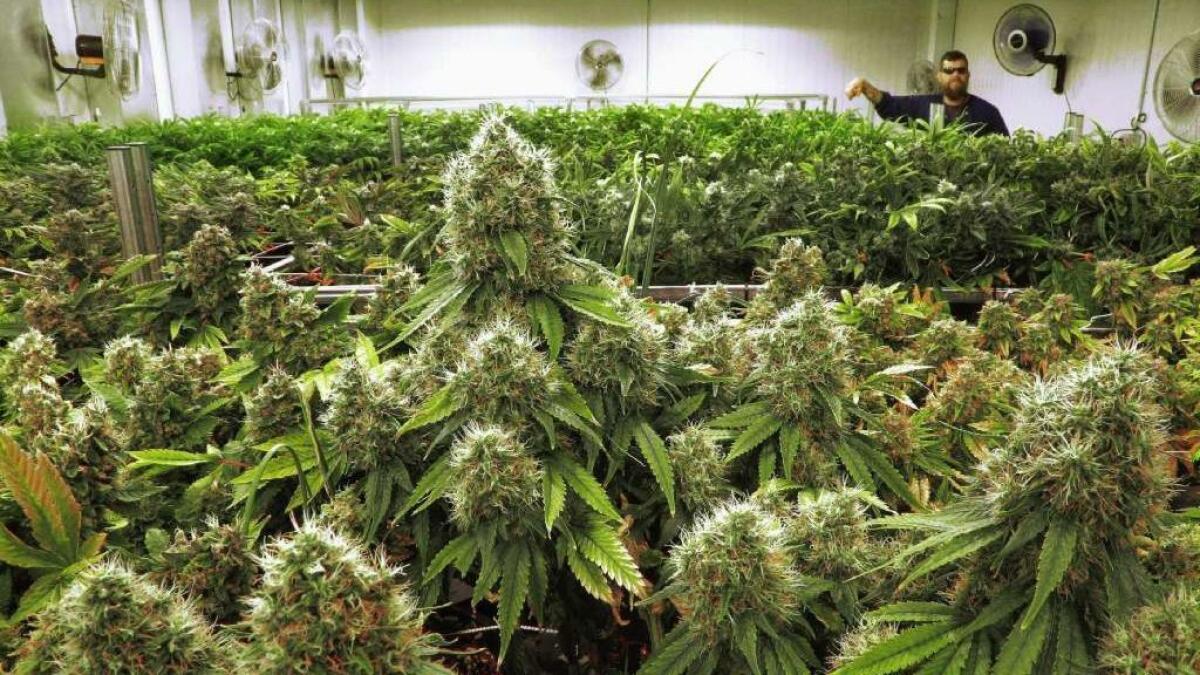Recreational marijuana movement takes root in Midwest but efforts elsewhere have stalled

The legal marijuana movement, which in recent years has flourished in coastal states, is taking up new roots in the Midwest even as efforts have stalled in nearly a dozen other states this year.
Lawmakers in Illinois approved a measure Friday to legalize the sale of marijuana to anyone over the age of 21, making it the second state in the nation’s interior to legalize pot, after Michigan.
To date, 11 states, including Illinois, have decided to legalize recreational marijuana, a majority through ballot measures placed before voters. The move by Illinois lawmakers is only the second time a legislature has legalized marijuana, following Vermont, which passed a measure last year allowing possession and limited cultivation of cannabis.
But since January, nearly a dozen other states have either spiked outright or taken no action on marijuana legalization measures.
Illinois Gov. J.B. Pritzker, a Democrat, made marijuana legalization a key pillar of his election campaign last year, and said in a statement Friday that the legislation in his state was long overdue.
“This will have a transformational impact on our state, creating opportunity in the communities that need it most and giving so many a second chance,” said Pritzker, who plans to sign the bill soon. The measure, which passed the Democratic-controlled Legislature, received staunch opposition from local police and sheriffs associations.
Steve Hawkins, executive director for the Marijuana Policy Project, a group that has worked on legalization efforts in several states, says that “heartland states are clearly deciding that the time to end the prohibition on cannabis has come.”
“Marijuana was at the heart of our nation’s disastrous war on drugs,” he said. “This is a measure that will improve people’s lives on a level commensurate with the devastation wrought by prohibition.”
At its core, the Illinois bill followed a nationwide trend tying marijuana legalization to criminal justice reform. The measure would allow adults 21 and older to purchase and possess up to 30 grams, or about an ounce. Those who had previously been convicted of possessing less than that amount would have their records automatically expunged. In addition, the measure creates a social equity program to help minority business owners enter the legal marijuana industry with state grants and loans.
Similar reforms have been implemented in California and Michigan.
Nationwide, calls for legalization and decriminalization of marijuana have taken on a new urgency in the past year, with politicians and activists alike calling for local and state measures to right past wrongs associated with the war on drugs.
Research shows that whites, blacks and Latinos use and sell marijuana at similar rates, but that blacks are by far the most likely to be arrested in connection with the drug. One California study found that African Americans make up 6% of the state’s population but nearly a quarter of those serving time exclusively for marijuana offenses.
Still, even with legalization in Illinois, several efforts have faltered in statehouses nationwide this year.
In New Jersey, even with staunch support from Democratic Gov. Phil Murphy, lawmakers have grappled with legalization for over a year. This spring, a legislative vote was called off because sponsors of the measure, which included social equity and expungement language, did not have enough votes.
Similar measures in New York and Pennsylvania have also stalled. Each of those pieces of legislation have seen pushback from law enforcement groups.
Newark Mayor Ras Baraka, who supports legalization and has worked on the issue with state lawmakers, says legalization is about correcting the past.
“This legislation has the potential to give hope and new beginnings to communities that have historically dealt with the impacts of failed drug policy,” he said.
The stalled efforts come even as national polls show bipartisan support for legal marijuana. Last fall, a Gallup poll found 66% of respondents supported the legalization of recreational use of marijuana in the U.S. A majority of Republicans surveyed — 53% — favored legalization. The October poll also showed that 71% of independents supported legalization, as did 75% of Democrats. Other surveys have shown similar results.
Mason Tvert, a partner at VS Strategies, a Denver-based group that has worked on legalization efforts in a number of states, stressed that although some legislation has hit roadblocks, there has also been progress.
“Lawmakers are working to replace a decades-old prohibition model with a complex regulatory structure,” Tvert said. “We now have governors calling for legalization and lawmakers making efforts at reform.... Ten years ago, lawmakers would have never taken on this issue.”
Others, however, see a slowdown for the pro-pot movement.
Kevin A. Sabet, president of Smart Approaches to Marijuana, which has spent thousands of dollars in recent years to oppose the legalization of recreational pot, says that “at the beginning of 2019, four to six states were overwhelmingly expected to legalize and commercialize marijuana.”
“Most didn’t because of an overwhelming — and in some ways unexpected — citizen backlash,” he said. “Our cause is about nothing less than simply doing something science and common sense say is right, and we believe in.”
More to Read
Sign up for Essential California
The most important California stories and recommendations in your inbox every morning.
You may occasionally receive promotional content from the Los Angeles Times.











